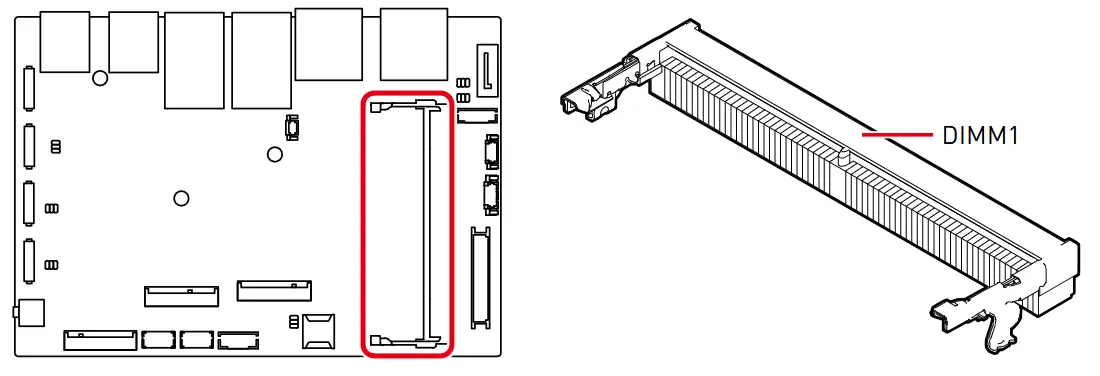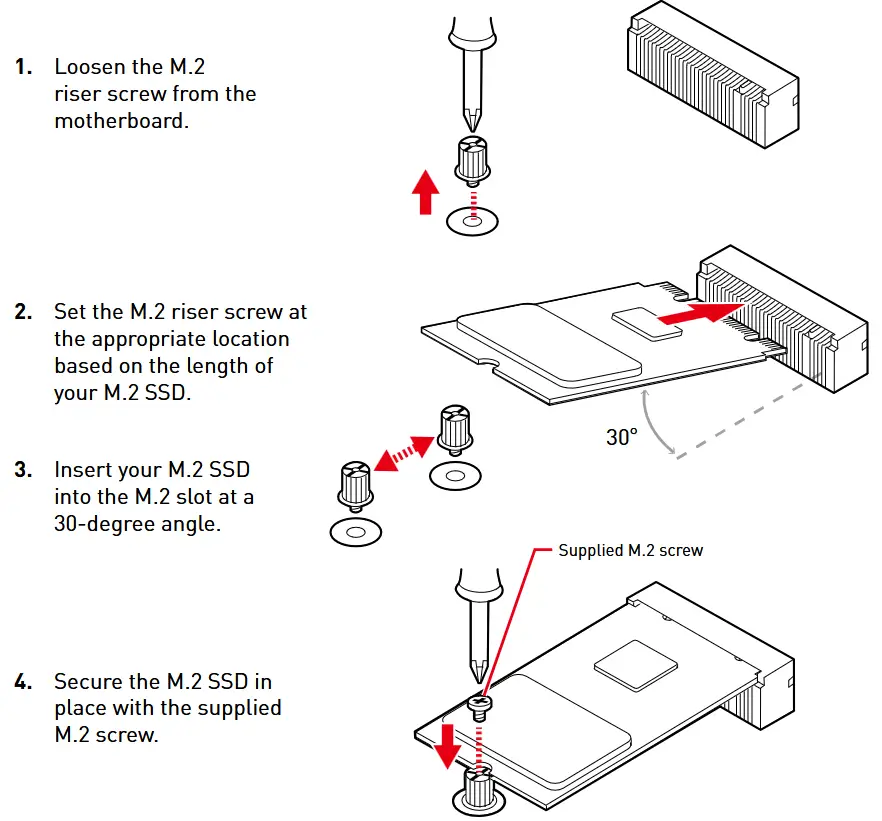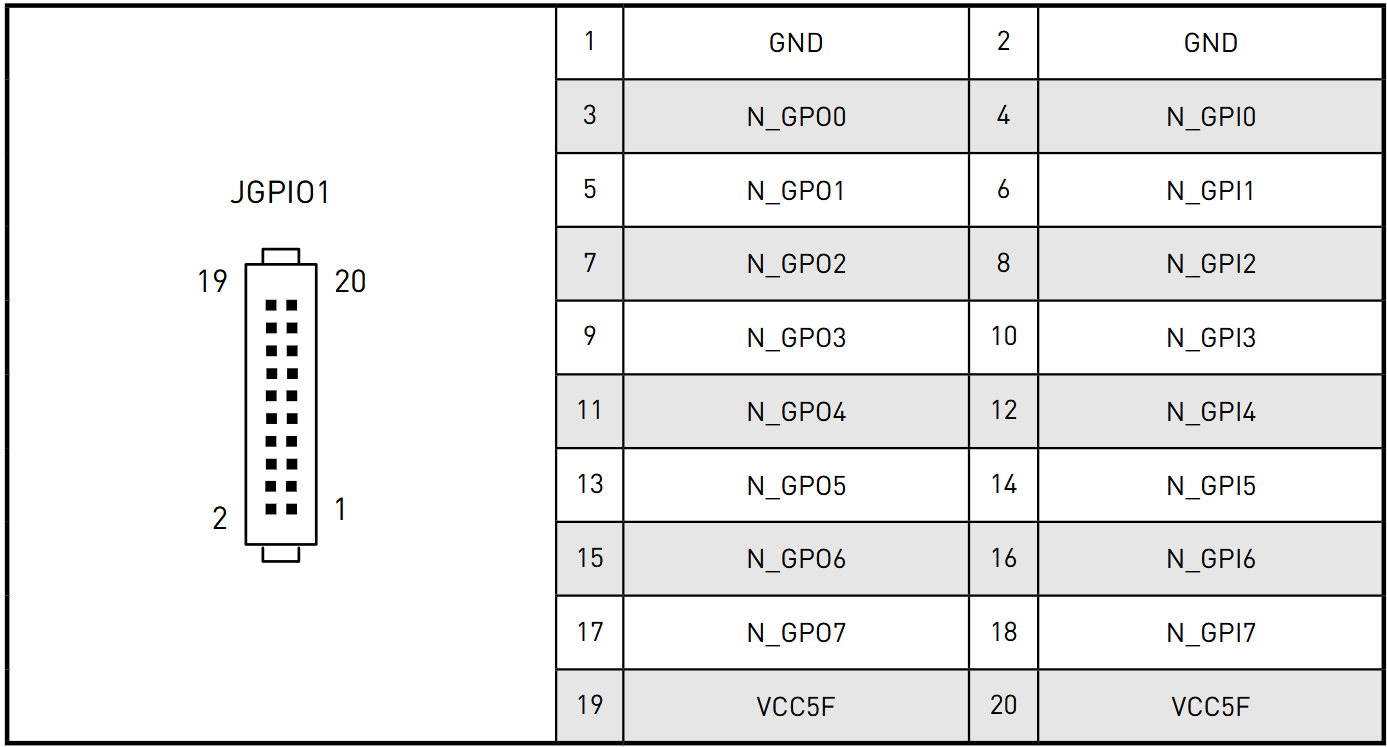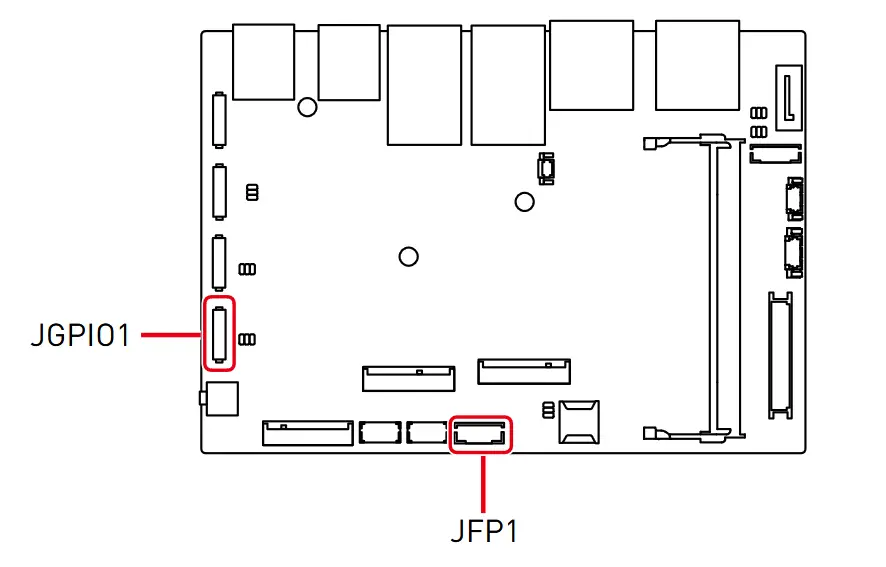mis ECF17v1.0 Industrial Computer Board Instruction Manual

Regulatory Notices
FCC-B Radio Frequency Interference Statement

This equipment has been tested and found to comply with the limits for a Class B digital device, pursuant to part 15 of the FCC rules. These limits are designed to provide reasonable protection against harmful interference in a residential installation. This equipment generates, uses and radiates radio frequency energy, and, if not installed and used in accordance with the instructions, may cause harmful interference to radio communications. However, there is no guarantee that interference will not occur in a particular installation. If this equipment does cause harmful interference to radio or television reception, which can be determined by turning the equipment off and on, the user is encouraged to try to correct the interference by one or more of the following measures:
- Reorient or relocate the receiving antenna.
- Increase the separation between the equipment and receiver.
- Connect the equipment into an outlet on a circuit different from that to which the receiver is connected.
NOTE
- The changes or modifications not expressly approved by the party responsible for compliance could void the user’s authority to operate the equipment.
- Shield interface cables and AC power cord, if any, must be used in order to comply with the emission limits.
FCC Conditions
This device complies with part 15 of the FCC Rules. Operation is subject to the following two conditions:
- This device may not cause harmful interference.
- This device must accept any interference received, including interference that may cause undesired operation.
CE Conformity
![]()
Hereby, Micro-Star International CO., LTD declares that this device is in compliance with the essential safety requirements and other relevant provisions set out in the European Directive.
WEEE Statement
![]()
Under the European Union (“EU”) Directive on Waste Electrical and Electronic Equipment, Directive 2012/19/EU, products of “electrical and electronic equipment” cannot be discarded as municipal waste anymore and manufacturers of covered electronic equipment will be obligated to take back such products at the end of their useful life.
Battery Information
Please take special precautions if this product comes with a battery.
- Danger of explosion if battery is incorrectly replaced. Replace only with the same or equivalent type recommended by the manufacturer.
- Avoid disposal of a battery into fire or a hot oven, or mechanically crushing or cutting of a battery, which can result in an explosion.
- Avoid leaving a battery in an extremely high temperature or extremely low air pressure environment that can result in an explosion or the leakage of flammable liquid or gas.
- Do not ingest battery. If the coin/button cell battery is swallowed, it can cause severe internal burns and can lead to death. Keep new and used batteries away from children.
European Union:
Batteries, battery packs, and accumulators should not be disposed of as unsorted household waste. Please use the public collection system to return, recycle, or treat them in compliance with the local regulations.
BSMI:
Please recycle waste batteries
For better environmental protection, waste batteries should be collected separately for recycling or special disposal.
California, USA:
The button cell battery may contain perchlorate material and requires special handling when recycled or disposed of in California.
For further information please visit:
http://www.dtsc.ca.gov/hazardouswaste/perchlorate/
Chemical Substances Information
In compliance with chemical substances regulations, such as the EU REACH Regulation (Regulation EC No. 1907/2006 of the European Parliament and the Council), MSI provides the information of chemical substances in products at:
https://csr.msi.com/global/index
Environmental Policy
![]()
- The product has been designed to enable proper reuse of parts and recycling and should not be thrown away at its end of life.
- Users should contact the local authorized point of collection for recycling and disposing of their end-of-life products.
- Visit the MSI website and locate a nearby distributor for further recycling information.
- Users may also reach us at gpcontdev@msi.com for information regarding proper Disposal, Take-back, Recycling, and Disassembly of MSI products.
Copyright and Trademarks Notice
![]()
Copyright © Micro-Star Int’l Co., Ltd. All rights reserved. The MSI logo used is a registered trademark of Micro-Star Int’l Co., Ltd. All other marks and names mentioned may be trademarks of their respective owners. No warranty as to accuracy or completeness is expressed or implied. MSI reserves the right to make changes to this document without prior notice.

The terms HDMI™, HDMI™ High-Definition Multimedia Interface, HDMI™ Trade dress and the HDMI™ Logos are trademarks or registered trademarks of HDMI™ Licensing Administrator, Inc.
Technical Support
If a problem arises with your product and no solution can be obtained from the user’s manual, please contact your place of purchase or local distributor. Alternatively, please visit https://www.msi.com/support/ for further guidance.
Safety Information
- The components included in this package are prone to damage from electrostatic discharge (ESD). Please adhere to the following instructions to ensure successful computer assembly.
- Ensure that all components are securely connected. Loose connections may cause the computer to not recognize a component or fail to start.
- Hold the motherboard by the edges to avoid touching sensitive components.
- It is recommended to wear an electrostatic discharge (ESD) wrist strap when handling the motherboard to prevent electrostatic damage. If an ESD wrist strap is not available, discharge yourself of static electricity by touching another metal object before handling the motherboard.
- Store the motherboard in an electrostatic shielding container or on an anti-static pad whenever the motherboard is not installed.
- Before turning on the computer, ensure that there are no loose screws or metal components on the motherboard or anywhere within the computer case.
- Do not boot the computer before installation is completed. This could cause permanent damage to the components as well as injury to the user.
- If you need help during any installation step, please consult a certified computer technician.
- Always turn off the power supply and unplug the power cord from the power outlet before installing or removing any computer component.
- Keep this user guide for future reference.
- Keep this motherboard away from humidity.
- Make sure that your electrical outlet provides the same voltage as is indicated on the PSU, before connecting the PSU to the electrical outlet.
- Place the power cord such a way that people can not step on it. Do not place anything over the power cord.
- All cautions and warnings on the motherboard should be noted.
- If any of the following situations arises, get the motherboard checked by service personnel:
• Liquid has penetrated into the computer.
• The motherboard has been exposed to moisture.
• The motherboard does not work well or you can not get it work according to user guide.
• The motherboard has been dropped and damaged.
• The motherboard has obvious sign of breakage. - Do not leave this motherboard in an environment above 60°C (140°F), it may damage the motherboard.
Specifications





Motherboard Overview

Rear I/O Panel

HDMI™ Connector 
HDMI™ is an all-digital interface for uncompressed audio/video streams, supporting standard, enhanced, or high-definition video, and multi-channel digital audio on a single cable.
2.5 GbE RJ-45 LAN Jack
The standard RJ45 LAN jack is provided for connection to the Local Area Network (LAN). You can connect a network cable to it.

USB 10Gbps Ports
This connector delivers high-speed data transfer for various devices, such as storage devices, hard drives, video cameras, etc.It supports data transfer rates up to 10 Gbps.
Memory
DIMM1: DDR5 SO DIMM Slot
The DIMM slot is intended for memory modules.

Installing DDR5 SO DIMM Memory Module
- Locate the SO-DIMM slot. Align the notch on the DIMM with the key on the slot and insert the DIMM into the slot.
- Push the DIMM gently downwards until the slot levers click and lock the DIMM in place.
● To uninstall the DIMM, flip the slot levers outwards and the DIMM will be released instantly.

● You can barely see the golden finger if the DIMM is properly inserted in the DIMM slot.
● To ensure system stability for Dual channel mode, memory modules must be of the same type, number and density.
Storage
SATA1: SATA 3.0 6Gb/s Port
The connector is a SATA 6Gb/s interface port, and can connect to one SATA device.

![]()
- The SATA connector supports hot plug.
- Please do not fold the SATA cable at a 90-degree angle. Data loss may result during transmission otherwise.
- SATA cables have identical plugs on either sides of the cable. However, it is recommended that the flat connector be connected to the motherboard for space saving purposes.
M2_M1: M.2 Slot (M Key, 2280)
Please install the M.2 solid-state drive (SSD) into the M.2 slot as shown below.
Installing M.2 SSD

Power Connectors

JPWR1: 4-pin DC-in Power Connector (12V~24V)
This connector allows you to connect a power supply. To connect to the power supply, make sure the plug of the power supply is inserted in the proper orientation and the pins are aligned. Then push down the power supply firmly into the connector.

SATAPWR1: SATA Power Connector
This connector is used to provide power to SATA devices.

![]()
Make sure that all the power cables are securely connected to a proper power supply to ensure stable operation of the system.
Graphics Connectors

JINVT1: LVDS Inverter Header
The connector is provided for LCD backlight options.

JLVDS1_EDP1: LVDS + eDP Wafer Connector
The connector is provided for LVDS/eDP interface flat panels. After connecting an LVDS/eDP interface flat panel to this connector, be sure to check the panel datasheet and set the JVDD1 LVDS jumper to proper power voltage.
![]()
Please refer to the following pages for the pin-out of the LVDS + eDP Wafter Connector and the pin-out for LVDS/eDP interface flat panels.


![]()
Pin 12 is a detect pin. When using a customized LVDS cable, pin 12 should be a signal ground with a low impedance. Otherwise, LVDS will not function.
Expansion Slots

USIM1: Nano SIM Holder
This holder is provided for 3G, 4G, LTE, 5G Nano SIM cards.

Feature
- Shared with M.2 B key slot
![]()
When adding or removing expansion cards, make sure that you unplug the power supply first. Meanwhile, read the documentation for the expansion card to configure any necessary hardware or software settings for the expansion card, such as jumpers, switches or BIOS configuration.
M2_E1: M.2 Slot (E Key, 2230)
Please install the Wi-Fi/ Bluetooch card into the M.2 slot as shown below.

Features
- Supports PCIe x1 & USB 2.0 signals
- Supports CNVi modules
M2_B1: M.2 Slot (B Key, 2242, 3042)
Please install the WWAN Card/ solid-state drive (SSD) into the M.2 slot as shown below.

Features
- Supports PCIe x1 & USB 2.0 signals
- Shared with Nano SIM Holder
Other Connectors
SYSFAN1: 4-pin PWM System Fan Connector
The fan power connector supports system cooling fans with +12V. When connecting the wire to the connectors, always note that the red wire is the positive and should be connected to the +12V; the black wire is Ground and should be connected to GND. If the motherboard has a System Hardware Monitor chipset onboard, you must use a specially designed fan with speed sensor to take advantage of the fan control.

JAUD1: Audio/ Amplifier/ SMBus Connector
This connector allows you to connect audio. It also supports amplifier function to enhance audio performance and SMBus, known as I2C, for connecting System Management Bus (SMBus) interface.


JUSB1~2: USB 2.0 Headers
These headers is ideal for connecting USB devices such as keyboard, mouse, or other USB-compatible devices. It supports data transfer rate up to 480 Mbps.

JFP1: Front Panel Connector
This front-panel header is provided for electrical connection to the front panel switches & LEDs and is compliant with Intel Front Panel I/O Connectivity Design Guide.

JGPIO1: GPIO (DIO) Header
This connector is provided for the General-Purpose Input/Output (GPIO) peripheral module.


JCOM1_2, 3_4: COM Port Box Headers (RS232/ 422/ 485)
These headers are 16550A high speed communications port that sends/ receives 16 bytes FIFOs. You can attach a serial device to it.

![]()
After connect COM port headers to printer, garbage can’t be printed when power on/ off.
Features
- Support True RS-232
- Support TTL RS-232
- Support Auto flow control
- RS- 422/ 485 support TR 1000+ Meter
- RS- 232/ 422/ 485, selection by BIOS control
JBAT1: CMOS Battery
If the CMOS battery is out of charge, the time in the BIOS will be reset and the data of system configuration will be lost. In this case, you need to replace the CMOS battery.
Replacing CMOS battery
- Unplug the battery wire from the BAT1 connector and remove the battery.
- Connect the new CR2032 battery with wire to the BAT1 connector.

![]() WARNING
WARNING
KEEP OUT OF REACH OF CHILDREN
- Swallowing can lead to chemical burns, perforation of soft tissue, can death.
- Severe burns can occur within 2 hours of ingestion.
- If you think batteries might have been swallowed or placed inside any part of the body, seek immediate medical attention.
Jumpers
![]()
Avoid adjusting jumpers when the system is on; it will damage the motherboard.


Documents / Resources
 |
mis ECF17v1.0 Industrial Computer Board [pdf] Instruction Manual ECF17v1.0, MS-CF17, ECF17v1.0 Industrial Computer Board, ECF17v1.0, Industrial Computer Board, Computer Board, Board |
